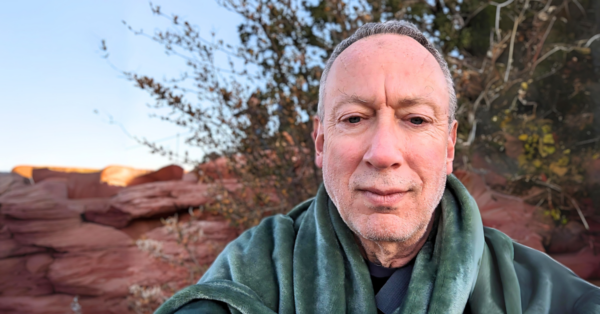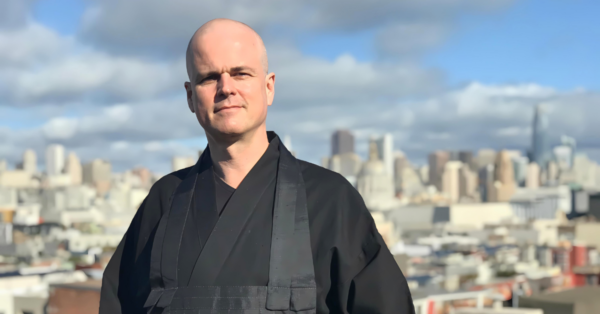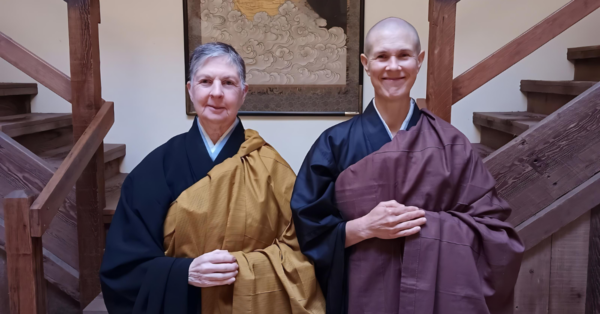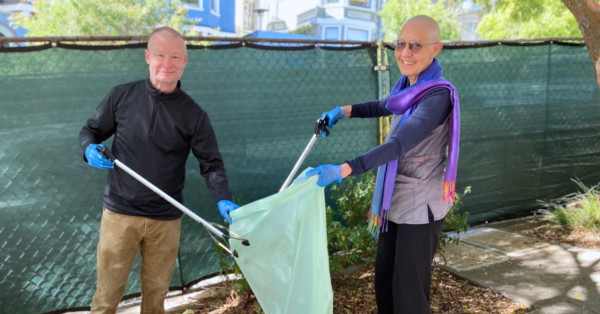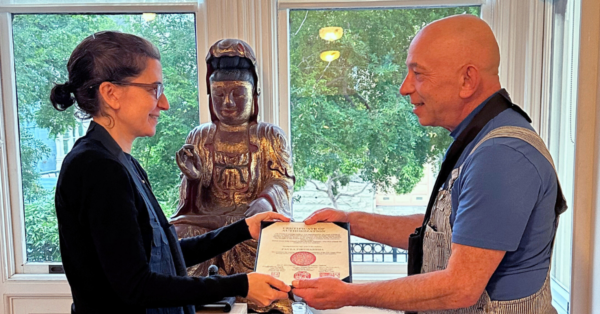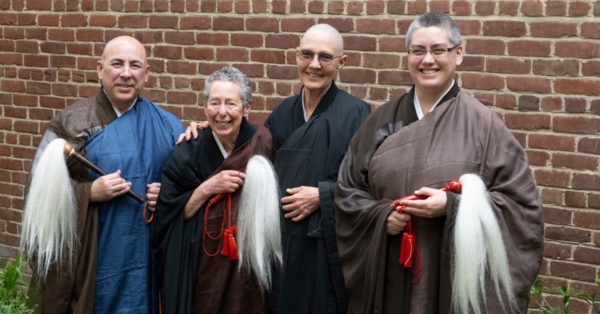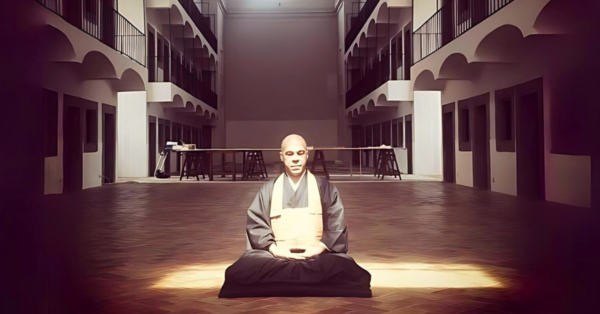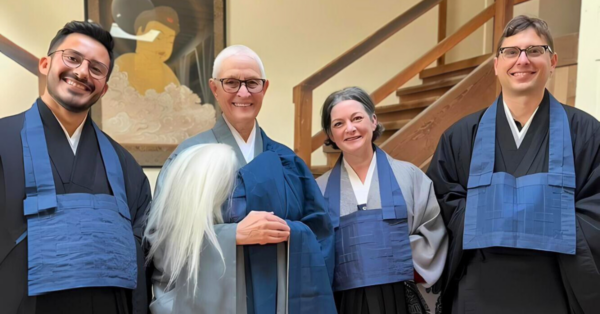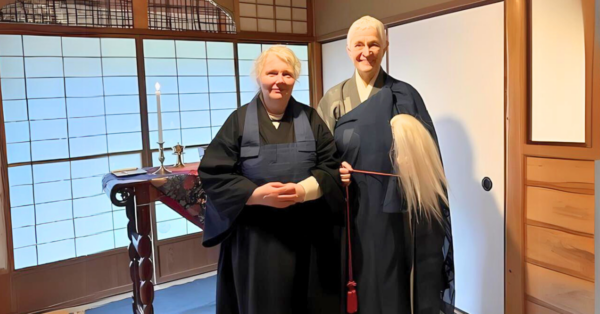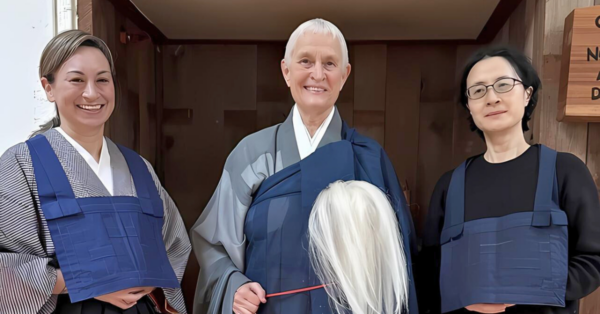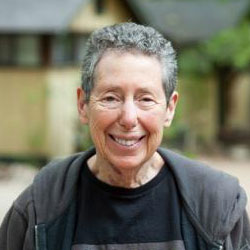 |
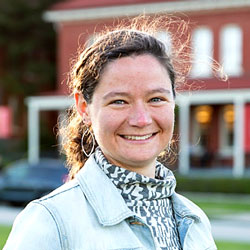 |
| Tova Green | Lucy Andrews |
Unpacking Whiteness is a SFZC affinity group. Currently held online, these gatherings explore whiteness and the structures of racism through a Zen Buddhist lens so that practitioners learn to skillfully engage with and transform white racial conditioning and white supremacist systems. Unpacking Whiteness focuses on racial justice, interconnection, and liberation, with the intention that sangha members build brave and inclusive spaces in their homes, workplaces, communities, and at San Francisco Zen Center.
Newcomers and seasoned practitioners who identify as white are wholeheartedly welcome.
City Center resident Dawu Whitney spoke with Unpacking Whiteness facilitators Tova Green and Lucy Andrews about the history and intention of the group.
It makes a difference when white people can see the ways we’re contributing to the oppression of people of color.
Dawu: Unpacking Whiteness started in July of 2017. Can you tell me more about how the group came about?
Tova: David Zimmerman (the current City Center Abbot) and I had both taken programs at East Bay Meditation Center led by Kitsy Schoen and Crystal Johnson. We were inspired by this work so we asked Kitsy and Crystal if they would do a class at SFZC. After the class ended we thought it would be good to start an ongoing group for white sangha members at SFZC.
Lucy: The structure of a class can be a good place to start and then there needs to be continuity since the work of anti-racism for a white person is lifelong. This group arose from the class in recognition of that need, and for accountability and action.
We have a steady group of folks who show up every month and there are always newcomers. Given the political circumstances of this year in particular, we’ve definitely seen an explosion in attendance.
Dawu: Lucy, what is your background with this kind of work? How did you come to it?
Lucy: My practice of anti-racism is deeper and older than my Buddhist practice. I have spent a lot of time in intentional communities to build liberatory space, including living in an intentionally interracial cooperative housing space for a year.
My peers and I put on a lot of programming and facilitated a white-identified group to look at anti-racism. That was my awakening in my late teens and twenties, having that as a job. I learned a lot, and made many mistakes.
I moved to California and saw that San Francisco Zen Center, a place where I had been practicing for a little while, had a class [led by Kitsy and Crystal] I thought: that’s perfect, let’ see what’s up there. Then Tova and David put out an open call for collaboration in leading the next version of that conversation, so I volunteered.
Tova (to Lucy): Although you practice at City Center and you come to different affinity groups, your primary teacher is Liên Shutt and her sangha is very diverse. I’m wondering if that contributes in some way to your wanting to keep this work going.
Lucy: One of my initial introductions to Buddhism at SFZC was through the “Buddhism 101” classes that Liên taught. I immediately appreciated the way she taught the Four Noble Truths, how she engaged with the suffering that I saw in the world. It was not so much about me and my own anxieties, though that was part of the examination, it was also about the ways we make each other suffer and the ways we experience social domination, power and oppression. I thought: here’s a teacher teaching in a language I appreciate, who has a moral understanding of Dharma that aligns with mine.
I wanted my path of study to have an engaged dimension. I really believe that a practice community should be just. I’m constantly challenged and I get feedback from my sangha on the ways that I show up that are useful or not, or that are harmful.
At the same time, I deeply love the monastic aspect of practice even though I have not lived in a monastic space. The feeling of sanctity at SFZC is beautiful and I respect the wisdom that comes from a deep study of Dharma, so I want to maintain a presence in that practice space, too.
I’ve heard people in Liên’s sangha say they don’t feel welcome at SFZC, that this is a space in which they have experienced racial harm. That upsets me and I want to do what I can to prevent that from happening. I believe that a diverse, liberated, racially just SFZC sangha is possible and I want to see it happen.
Dawu: Tova, is there more you want to say about your history with SFZC?
Tova: I first practiced Zen at Berkeley Zen Center and Green Gulch Farm, and then gradually I started participating in City Center programs. I was aware of how white those three places were. I wanted SFZC to be more inclusive from the time I started living here in 1999.
When I moved to the Bay Area, I got involved with the Buddhist Peace Fellowship and was part of a group of Buddhists, not all Zen, that started meeting to look at racism in our sanghas. I met a number of practitioners of color as well as practitioners from Vipassana, Zen, and Tibetan practice centers. We put together a booklet called Making the Invisible Visible, which was really important work.
I was an activist before I was a Zen student. The main form my activism is taking these days is doing this work on whiteness because I believe it makes a difference when white people can see the ways we’re contributing to the oppression of people of color. It’s really sometimes hard to see. I’m aware that more residents, community members, and people in leadership roles are seeing this as important as well. This keeps me going.
I’m still hopeful that a liberated, compassionate, radically equal way to live and practice together is possible and I’m starting to see the seeds of that.
Dawu: How has the group changed over time?
Lucy: We spent a lot of time in the beginning talking about what is whiteness in a very personal sense, what does it mean to inhabit a white body, and also what is whiteness as a political and social condition — what are the ways in which privilege manifests in terms of access to power and institutional resources. What are the ways in which the benefits of whiteness are predicated on violence toward Black bodies.
White cultural rhetoric is changing, at least among some people in places like the Bay Area. Many more folks today understand whiteness is a racial identity, that white supremacy exists (though we may have quarrels about what that actually means) and that racism is alive and well in the US. These are now shared understandings that we couldn’t have anticipated when we started three years ago.
More recently we’ve been able to push the boundaries toward what are people’s personal practices around racism and accountability — not just definitions but looking at what they are doing. How their lives and community connect to bigger structures, structures that have historical roots, that harken back to chattel slavery and colonialism. So the conversation is deepening in terms of action orientation and rigor.
Tova: There are four dimensions of working on racism: Intrapersonal level (within oneself), interpersonal, community, and society.
Initially we focused on the intrapersonal dimension, such as ‘when did you first realize you were white?’ Then we began looking at some of the impacts such as microaggressions. We provided background on how societal notions of race came to be and some of the history of racism in our country, redlining, etc. Many sessions focused on how to talk with other white people about race. We did many role plays.
As Lucy said, now we’re moving into the institutional and systemic aspects which we have to face if we’re going to change anything. We might have close personal relationships with POC in which we can be open and honest but that’s not going to change our institutions. It’s important but it’s not enough.
Three recent meetings have been about policing and the prison-industrial system. Because racial inequities are more visible due to Covid-19 as well as the protests against police violence, people are more aware of the injustice and are asking what we can do about it.
Lucy: It’s nice to have a shared analysis, not just definitions but also an understanding of cause and effect, as a group. Then the conversation expands beyond the narrow domain of prejudicial racism and starts to be about how white people engage with things like money and recognizing that our economy is structurally racial capitalism and the foundation of our economy is based on the extraction of resources from the bodies of Black and Brown people.
When we say we’re concerned about economic justice or climate justice or carceral justice, all of these are ways of saying anti-racism or racial justice.
Dawu: What are you finding inspiring about working with the group?
Tova: The level of commitment many participants have to doing this work is very inspiring. I see them coming back and growing and speaking with more ease about whiteness and seeing some of the ways in which we cause harm inadvertently.
I see people viewing things differently at SFZC now. Some of the people who come to the group faithfully are taking the practice into their lives, relationships and work. I find that so encouraging.
Lucy: We’ve definitely had some frequent fliers and i’s been great to get to know them not just as part of the group but as individual people. It has felt very socially connecting for me.
It’s also a social privilege to be empowered to teach. I have had to clean up my act in a good way and to make sure I’m clear on what I’m talking about and personally how I live out my commitments. I’m being called to responsibility by being asked to hold space in this way and that’s a blessing. It helps me to keep showing up.
It could be so easy for me to put down this work since my life is full. But when I know Tova and I need to meet to plan and then hold space together, I keep showing up. I’m not perfect – I will forever be learning and unintentionally acting racist and having to repair my mistakes, but I believe in the work, and I’m committed to the long haul. To draw on the wisdom of Rhonda Magee, I want to stay in relationship in the shared pursuit of justice.
I’m still hopeful that a liberated, compassionate, radically equal way to live and practice together is possible and I’m starting to see the seeds of that.
Tova: People in leadership are discussing how to have a bigger impact on the culture of SFZC. What could we do to support a parallel group for POC? Perhaps then we could come together and talk about those issues together. Lucy and I would both like to see that our work is relevant and that SFZC is moving in terms of more equity and inclusivity for different groups
Lucy: A group like Unpacking Whiteness can’t stand alone. Given the structure of SFZC and both of our positions, we’re trying to understand what deeper accountability looks like. What is a way that Unpacking Whiteness can be accountable to practitioners of color at SFZC? How can we build out those relationships and mechanisms?
What does it look like for practitioners of color at SFZC to have a space of their own that is protected, resourced and joyful? Because it feels imbalanced to have a group of white practitioners doing this work and then to not resource a space for practitioners of color to feel like they can let down their guard and be themselves in ways that are often impossible around white folks. These are the goals for the next phase.
Anti-racism organizing and action in institutions needs to be coalitional,so understanding what it looks like for a group of white practitioners who have an awareness of how they manifest whiteness can then act in support of their peers of color. Bigger picture questions, we don’t have all the answers.
Tova: I know that many of the people who are coming are taking this back to their workplaces, their relationships, their families, maybe their institutions. What we’re doing ripples out—you never know all the ways in which it does that.
The other thing that keeps me going is Lucy [they both laugh].
Lucy: We do like working together.
I believe that the practice of anti-racism is the fulfillment of our bodhisattva vow. If we are practicing for all beings, if we are looking to bring an end to all delusion, if we are looking to cease suffering—this is the path.
Dawu: Is there anything else you think would be good for people to know [about the group]?
Tova: I would like people to know that they’re welcome. They can enter this practice of self-study and societal study at any time. It’s interesting to me that people now come from around the country [because of Zoom]. Unpacking Whiteness groups are starting up at other Zen centers and I think it’s transformative work
Lucy: I’ve got two thoughts. One of the goals I have for Unpacking Whiteness is accountability and to be more transparent about what the group is doing. So we’re making our resource list available for this interview. [See below.]
I think it’s important for a group of white people to be transparent because historically groups of white people getting together to talk about stuff in a corner has produced violence. So we want to be very transparent about what the group is.
Secondly, I believe that the practice of anti-racism is the fulfillment of our bodhisattva vow. If we are practicing for all beings, if we are looking to bring an end to all delusion, if we are looking to cease suffering—this is the path.
It’s a bold and global statement, but I think anyone’s practice is incomplete without an understanding of race and liberation and that is particularly true for white folks. So I challenge people if they haven’t taken up this work to do so—and there’s a lot of ways to do so, they don’t have to necessarily come to our group. An understanding of racial harm in America is inherent to being an enlightened practitioner.
Tova: Beautifully said. That brought tears to my eyes. She speaks for me. I agree!
Resources:
More information on joining the Unpacking Whiteness meeting (currently being held online.) The next meeting is on August 17, 7:30 – 8:30pm PT. Dates for the Fall meetings will be available soon.
Unpacking Whiteness resources list (includes slide decks from previous meetings)
Article on the forming of Unpacking Whiteness in 2017
A Dharma talk from Crystal A Johnson


